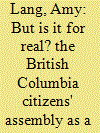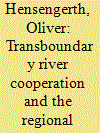|
|
|
Sort Order |
|
|
|
Items / Page
|
|
|
|
|
|
|
| Srl | Item |
| 1 |
ID:
077223


|
|
|
|
|
| Publication |
2007.
|
| Summary/Abstract |
Emerging forms of empowered participatory governance have generated considerable scholarly excitement, but critics continue to ask if such initiatives are "for real": Are participatory governance processes sufficiently independent? Do citizen participants make good policy choices? An in-depth look at the case of the British Columbia Citizens' Assembly on Electoral Reform suggests that real citizen empowerment depends on both the institutional constraints of the participa-tory setting and how citizen interests and arguments for policy outcomes crystallize over the course of a participatory process
|
|
|
|
|
|
|
|
|
|
|
|
|
|
|
|
| 2 |
ID:
152782


|
|
|
|
|
| Summary/Abstract |
The last environmental impact assessment (EIA) related to Ecuador’s first large-scale open pit copper mine, the Mirador project, was presented to the public in March 2015. In this article, we discuss how the rural mestizo population and Shuar indigenous people, who are under increasing pressure from the government and the mining company, contest the current politics of accountability related to the making and dissemination of this EIA. We analyse how formal instruments of governance related to participation (prior consultation) and environmental management (environmental impact monitoring), are re-used in the affected population’s resistance work. We look at how these formal instruments are put to independent and political use as part of an extended struggle for influence over the process of transformation that the mega mining project generates. The article contributes to a discussion around participatory strategies that build on new conversations between ‘popular environmentalists’ and social/earth scientists.
|
|
|
|
|
|
|
|
|
|
|
|
|
|
|
|
| 3 |
ID:
175424


|
|
|
|
|
| Summary/Abstract |
As marine ecosystems decline globally, scientists recommend increasing the coverage of marine protected areas (MPAs), but many are not effectively managed to deliver benefits. Community integration into decision-making can increase effectiveness by supporting behavior change, but this poses implementation challenges. We examine differences in adaptive capacity, community engagement, and perceived MPA benefits using interviews and focal groups in two fishing communities from MPAs with different management strategies and geographic settings: a centrally managed MPA in Kenya and a co-managed MPA in Tanzania. Far fewer Kenyan community members (37%) felt they benefited from the MPA compared to Tanzanian community (95%). Agency, trust, and MPA support were largely similar. Both systems had challenges that reduced collaborative action including: low staff-community interaction and communication, leadership challenges, and social conflict. We identified pathways towards improved co-management that transcend systems: institutional prioritization of community integration, investment in community leadership, mapping social networks, and adequate MPA budgets.
|
|
|
|
|
|
|
|
|
|
|
|
|
|
|
|
| 4 |
ID:
077225


|
|
|
|
|
| Publication |
2007.
|
| Summary/Abstract |
Through a comparative, longitudinal analysis of the wine industry in two Argentine provinces, this article finds that different political approaches to reform and not simply socioeconomic endowments determine the ability of societies to build new institutions for economic upgrading. A "depoliticization" approach emphasizes the imposition of arm's-length incentives by a powerful, insulated government but exacerbates social fragmentation and impedes upgrading. A "participatory restructuring" approach promotes the creation and maintenance of new public-private institutions for upgrading via rules of inclusive membership and multiparty, deliberative governance. This latter approach can facilitate collaboration and knowledge creation among the government and previously isolated, even antagonistic, stakeholder groups.
|
|
|
|
|
|
|
|
|
|
|
|
|
|
|
|
| 5 |
ID:
089917


|
|
|
|
|
| Publication |
2009.
|
| Summary/Abstract |
The article compares three cooperation projects in the Mekong River basin: the Greater Mekong Subregion, the Quadripartite Economic Cooperation initiative and the Mekong River Commission. It analyses the three projects by asking if and how they produce a regional public good. Part of the public good discussion is participatory governance, which, in natural resource management, has become a prominent proposal for enhancing the efficiency of resource management by involving all relevant stakeholders. The central question is whether participatory governance leads to the avoidance of conflict, better resource management, and thus the creation or maintenance of a regional public good. The article will address the relevance of these concepts for watershed management of the Mekong River.
|
|
|
|
|
|
|
|
|
|
|
|
|
|
|
|
|
|
|
|
|